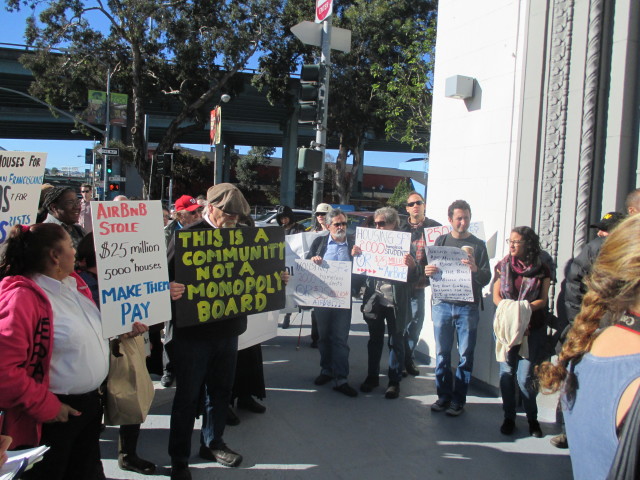Obama wants to end tax breaks for big corporations; will his party in SF go along?

By Tim Redmond
JANUARY 22, 2015 – The San Francisco Democratic Party has moved to the right in the past couple of years, but an unusual alliance is now pushing a measure to force Airbnb to pay its back taxes – and it may leave some committee members in an embarrassing spot.
The Democratic County Central Committee measure is sponsored by Sup. David Campos, state Sen. Mark Leno, and DCCC member Megan Levitan. It’s safe to say that Campos and Levitan are often on different sides on the panel.
It’s also likely that U.S. Sen. Dianne Feinstein, who has a lot of problems with Airbnb, will direct her proxy to vote for the resolution.
And Leno’s role puts him at odds with Assemblymember David Chiu, who sponsored the legislation that allows Airbnb to operate legally in the city and who strongly opposed an attempt by Campos to require the company to fork over some $25 million it owes in back taxes.
Now, at a time when President Obama is calling for higher taxes on the rich to help the middle class, how many members of the city’s Democratic Party are going to vote to let a big, wealthy company skip out on its local tax bill?
Here’s the text of the resolution, which will be on the agenda for the DCCC meeting Jan. 28:
WHEREAS San Francisco is facing a severe shortage of housing that is exacerbated by short-term residential rentals to tourists, through platforms such as Airbnb, a multi-national corporation valued at more than $13 billion which carries more than 5,000 San Francisco listings, two-thirds of which as reported by the San Francisco Chronicle on June 14, 2014 are for entire units, not shared dwellings; and
WHEREAS the San Francisco City Treasurer, over the objections of Airbnb and the Mayor, determined in April of 2012 that short-term residential rentals to tourists were liable for the same transient occupancy tax collected and remitted by hotels which funds are used to support numerous arts organizations and defray the costs of public services and amenities; and
WHEREAS, while Airbnb agreed to begin collecting and remitting transient occupancy taxes in October of 2014, the City appears to have made no discernible effort to collect back taxes from short-term residential rentals since his ruling that taxes were owed in April 2012, which taxes due from Airbnb alone are estimated to exceed $25 million and which could potentially pay for:
- 125 new ambulances or
- 200 new police officers or
- 31 hybrid Muni busses or
- 50 units of affordable housing or
- Annual salaries for 250 nurses or public school teachers or
- 8 million home-delivered meals for seniors or
- Permanent housing for homeless families;
NOW THEREFORE BE IT RESOLVED that the Democratic County Central Committee of San Francisco demands the immediate payment of all past due taxes owed to the City by Airbnb and other so-called “hosting platforms,” and that if necessary, this matter be referred to the City Attorney to bring suit to collect all back taxes owed from short-term residential rentals to the City and County of San Francisco.
Seems simple enough. And passage would be a boost to the efforts by Sup. David Campos to pass through the new Board of Supervisors a measure similar to the one he tried to pass when Chiu’s legislation came up last year.
“It’s an interesting alliance that in itself reflects how across the board, people are not happy the Airbnb continues to dodge its taxes,” Dale Carlson, who is working on an Airbnb reform initiative, told me.
“This is America, you pay your taxes. They were told more than three years ago that the transit occupancy tax applied to them and they’ve had more than enough time. Now belly up to the bar and pay the tab.”
Meanwhile, while San Francisco can’t even figure out how to collect back taxes, the New York City Council is raking Airbnb over the coals.
Council members repeatedly insisted the site’s listings meant a headache for neighbors, often violate state law, and lead landlords to take already scarce housing off the rental market to use as lucrative illegal hotel rooms, worsening the city’s affordable housing crisis.
Sounds like San Francisco.




